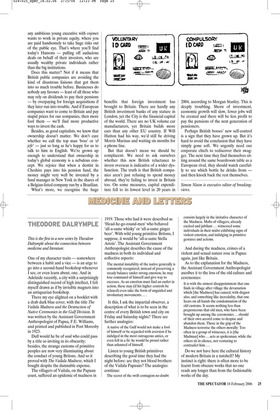This is the first in a new series by Theodore Dalrymple about the connection between medicine and literature.
One of my character traits — somewhere between a habit and a vice — is an urge to go into a second-hand bookshop whenever I see, or even learn about, one. And in Adelaide recently, a city with a surprisingly distinguished record of high intellect, I felt myself drawn as if by invisible magnets into an antiquarian bookshop.
There my eye alighted on a booklet with a drab dark blue cover, with the title The Vailala Madness and the Destruction of Native Ceremonies in the Gulf Division. It was written by the Assistant Government Anthropologist of Papua, F.E. Williams, and printed and published in Port Moresby in 1923.
Dull would he be of soul who could pass by a title so inviting in its obscurity; besides, the strange customs of primitive peoples are now very illuminating about the conduct of young Britons. And so it proved with The Vailala Madness, which I bought despite the damnable expense.
The villagers of Vailala, on the Papuan coast, suffered an epidemic of madness in 1919. Those who had it were described as ‘Head-he-go-round-men’ who behaved ‘all-a-same whisky’ or ‘all-a-same ginger beer’. With wild young primitive Britons, I suppose, it would be ‘all-a-same Stella Artois’. The Assistant Government Anthropologist describes the cause of the madness in both its individual and collective aspects:
The mental instability of the native generally is commonly recognized; instead of preserving a steady balance under strong emotion, he may lose command of himself and give way to excesses. As an emotion must find an outlet in action, these may (if his higher controls be relaxed) even take the form of unguided and involuntary movements....
Is this, I ask the impartial observer, a description of what is to be seen in the centre of every British town and city on Friday and Saturday nights? There are further analogies:
A native of the Gulf would not make a fool of himself or be regarded with aversion if he indulged in the most outrageous antics, or even fell in a fit: he would be proud rather than ashamed of himself.
Listen to young British primitives describing the good time they had the night before: are they not blood brothers of the Vailala Papuans? The analogies continue:
The secret of the swift contagion no doubt consists largely in the imitative character of the Madness. Mobs of villagers, already excited and jubilant ... witnessed some individuals in their midst exhibiting signs of violent emotion, and indulging in primitive gestures and actions.
And during the madness, crimes of a violent and sexual nature rose in Papua: again, just like Britain.
As to the explanation for the Madness, the Assistant Government Anthropologist ascribes it to the loss of the old culture and ceremonies:
It is with the utmost disappointment that one finds in village after village the devastation which [the Madness] has caused; with disgust also, and something like incredulity, that one hears on all hands the condemnation of the old customs. It seems nothing less than preposterous that old men, who have been brought up among the ceremonies ... should of their own accord come to despise and abandon them. Those in the grip of the Madness terrorise the others morally: Too often in a group of witnesses, it is [the Madman] who ... acts as spokesman, while the others sit in silence, not venturing to contradict him....
Do we not have here the cultural history of modern Britain in a nutshell? My instinct is right: there is often more to be learnt from obscure works that no one reads any longer than from the fashionable works of the day.


















































































 Previous page
Previous page